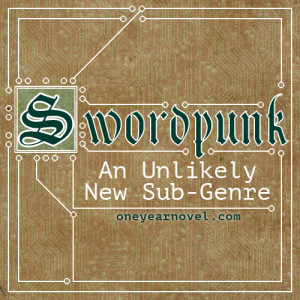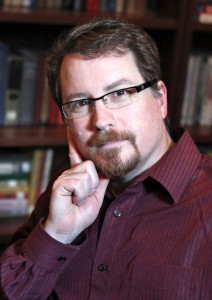Swordpunk: An Unlikely New Sub-genre
By Daniel Schwabauer

This is Part 7 of an ongoing mini-series chronicling the “story of a story”: Daniel’s work-in-progress, a swordpunk novel.
Part 1: What to Do with a Story Idea That Won’t Give Up on You? »
Part 2: When Your “Perfect” Story Falls Flat »
Part 3: Growing a Story from the Spine Out »
Part 4: Story World Maps: Worthwhile or a Waste of Time? »
Part 5: Unforeseen Endings & Other Gifts of a Flexible Novel Outline »
Part 6: How a Critique Group Exposed My Secret Flaws »
…
If you’ve read the previous posts in this series, you know my new novel paints outside the lines.
In the Shadow of the Wise is swordpunk, a blend of medieval culture and cybernetic elements such as artificial intelligence and robotics. Though I like to think the idea for the genre originated with my book, writers were cross-pollinating these story elements before I was born.
In my case, the idea came from asking what would happen if steampunk were taken to extremes. That is, if steampunk is a blend of Victorian culture and slightly advanced technologies, what would happen if the culture were pushed farther back, and the technologies shoved farther forward? What would it look like to blend 14th-century values with 24th-century bio-tech?
It seemed to me that the fun of this story type would lie in finding ways for it to make sense. Science fiction, after all, depends on making the improbable seem not just possible, but necessary. So why might the medievals have cyborgs? Why might a future civilization return to feudal governance and the re-integration of church and state? How might a science-based culture be simultaneously dominated by religious convention?
Science fiction is fully capable of asking these questions, and yet it generally doesn’t. I suspect the reason is that most spec-fic writers believe medieval and Renaissance thinking was hopelessly disconnected from reality.
Post-modernism has relegated the non-materialist faiths to the dustbin of history. Thus, when SF writers take us back in time, it’s usually from a position of rational superiority. We judge medievals by their ignorance, because they didn’t know what we do. We’re rarely asked to consider that perhaps they knew things we’ve forgotten.
This is the essence of swordpunk. As least, it’s the essence of the “new sub-genre” I’m trying to imagine. But I don’t think any one writer invents a genre. Even Tolkien, the venerable dean of heroic fantasy, followed in the footsteps of Robert E. Howard and Eric Eddison. Fortunately, as I mentioned earlier, other great writers have already laid a foundation for a separate category by juxtaposing ancient cultures and advanced technologies.
Roger Zelazny’s Chronicles of Amber series mixes high fantasy and science fiction in way that might be considered swordpunk—or something like it. I don’t see swordpunk as fantasy, but maybe that’s not for me to say. And Zelazny showed that the mixture is workable.
Orson Scott Card’s Treason comes pretty close too, except that its juxtaposition is more spiritual than cultural. But again, maybe that’s drawing too fine a line.
Frank Herbert’s Dune is probably the closest thing to swordpunk in the science fiction multiverse. My three rules for swordpunk are listed below. I’ll leave it readers to decide if Dune really fits.
But even though such stories have existed, they’ve always been classified as part of some other category. We’ve had no definition to provide clear boundaries. Hugo Gernsback’s use of “scientifiction” set the wheels of sci-fi in motion, and even though his term didn’t stick, the genre did.
Which brings me to the point of this post. I’d like to invite other writers to develop the genre. I think swordpunk has more potential than I can ever squeeze out of it by myself. So consider this a formal invitation. I’d love to read other interpretations of the swordpunk idea, both in novel and short story form.
To get the ball rolling, here are the genre rules as I see them—the basic elements of any swordpunk story:
1. Advanced, human-centered technologies, such as A.I.s and cyborgs
2. A medieval or renaissance culture and accompanying mind-set
3. Justification for the co-existence of #1 and #2
Sci-fi great James Gunn used to tell me that science fiction is a literature of ideas, humanity and technology. He was right, of course. (And if you want to learn more about science fiction, do yourself a favor and read his anthology The Road to Science Fiction. You won’t find anything better.)
Swordpunk strikes me as a perfect Venn diagram of Gunn’s elements: technology (#1), humanity (#2) and ideas (#3). I’ve also found it to be fun.
Who’s to say the future can’t bring us the best of opposite worlds?
Who says we can’t wear jet-packs and chainmail?
…
Can you think of any other works of fiction that might fit this definition of swordpunk?
…
 Daniel Schwabauer, MA, is the creator of The One Year Adventure Novel and Cover Story Writing creative writing courses. His professional work includes stage plays, radio scripts, short stories, newspaper columns, comic books and scripting for the PBS animated series Auto-B-Good. His young adult novels, Runt the Brave and Runt the Hunted, have received numerous awards, including the 2005 Ben Franklin Award for Best New Voice in Children’s Literature and the 2008 Eric Hoffer Award. His third book, The Curse of the Seer, released in the summer of 2015.
Daniel Schwabauer, MA, is the creator of The One Year Adventure Novel and Cover Story Writing creative writing courses. His professional work includes stage plays, radio scripts, short stories, newspaper columns, comic books and scripting for the PBS animated series Auto-B-Good. His young adult novels, Runt the Brave and Runt the Hunted, have received numerous awards, including the 2005 Ben Franklin Award for Best New Voice in Children’s Literature and the 2008 Eric Hoffer Award. His third book, The Curse of the Seer, released in the summer of 2015.



This is GREAT, Mr. S! I can’t wait to read /In The Shadow Of The Wise/. You’ve really piqued my interest. 😀
I’m interested in testing the waters with this sub-genre, but I’m not sure how to pursue it… To be discovered. :}
Also, as far as books that might fit this sub-genre, I didn’t read this book but I heard about Mark Twain’s novel /Connecticut Yankee in King Arthur’s Court/. It’s about a 19th-century Connecticut man suddenly finds himself in 6th-century England, and, with his knowledge from the future, creates big changes in the land of King Arthur as he masquerades as a magician.
The negative side is that Mark Twain makes all of the 6th-century characters as a lot less intelligent than the Connecticut Yankee. 🙁
Swordpunk is a very cool idea. In the Shadow of the Wise sounds like it could be an incredible story. I cannot wait to be able to read it and see what your vision of swordpunk is.
Thanks for the post, Mr. S- I really want to read In the Shadow of the Wise now!
As for others that may fit Swordpunk, Cinder by Marissa Meyer seems to fit. Though that one is a bit more veering towards the tech side of things.
Swords, cellphones, superpowers, portholes and biotech. These are the elements that have naturally populated all my stories for years. Thank you for posting this, Mr. S. I thought I was alone in my subgenre I dubbed “swords and cellphones” until I read about your story. Although, I don’t have a JARVIS or quite the same worlds you do, it’s awesome to know THERE ARE MORE SWORDS AND CELLPHONE WORLDS OUT THERE! 😀 *ecstatic joy* ;D
I’ve unknowingly been writing a story that perfectly fits all the points listed for my pen and paper roleplaying game “The nine Circles” (work in progress) just with the difference of it being based in eastern societal and specially spiritual medieval values instead of western. I guess it must count too.
Kenshi is all the swordpunk and then some.
Science fiction, in literature, is defined as a category of speculative fiction that commonly showcases futuristic and extraordinary ideas, like space exploration, technological advancement, aliens, and more. In the platform of film, on the other hand, science fiction is referred to as the genre that utilizes imaginary and fictional science and technological-based portrayal of events that are not totally accepted by the integrating science. Regardless of what avenue it is, science fiction is truly one of the genres that have made it to the to-be-read and must-watch lists of every patrons.